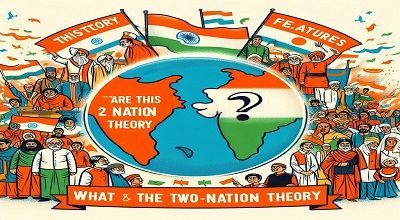Two Nation Theory
The Two Nation Theory is a political and ideological concept that played a significant role in the creation of Pakistan in 1947. It was developed by Allama Muhammad Iqbal, a philosopher, poet, and politician. Further articulated and implemented by Muhammad Ali Jinnah, the founder of Pakistan. The theory is rooted in the idea that Hindus and Muslims in British India were distinct nations with their own religious, cultural, social, and political identities. Here are the key history and features of the Two Nation Theory:
1. Historical Background:
- The British colonial rule in India from the 18th century led to political, social, and religious tensions among various communities, including Hindus and Muslims.
- The Indian National Congress, initially a secular organization, eventually started representing the interests of the Hindu majority.
2. Allama Iqbal’s Contribution:
- Allama Muhammad Iqbal, a prominent philosopher and poet, first proposed the idea of separate Muslim states within India in the early 20th century.
- He argued that Muslims in India should have their own political entity to safeguard their interests and religious freedom.
3. Muhammad Ali Jinnah and the Muslim League:
- Muhammad Ali Jinnah, the leader of the All-India Muslim League, embraced the Two Nation Theory and became its most prominent advocate.
- Jinnah believed that Hindus and Muslims had distinct cultural, religious, and political interests. And that a united India would not adequately protect the rights and aspirations of the Muslim minority.
4. Demand for Pakistan:
- The Muslim League, under Jinnah’s leadership, officially demanded the creation of a separate Muslim state, Pakistan, during the Lahore Resolution in 1940.
- The demand for Pakistan was based on the Two Nation Theory, asserting that Muslims and Hindus. Were two separate nations that could not coexist within a single, united India.
5. Partition of India:
- The Two Nation Theory played a crucial role in the negotiations leading to the partition of India in 1947.
- India was divided into two independent nations: India and Pakistan, with Pakistan comprising West Pakistan (present-day Pakistan) and East Pakistan (now Bangladesh).
6. Features of the Two Nation Theory:
- Distinct Identity: It posits that Hindus and Muslims have distinct religious, cultural, and social identities.
- Separate Homelands: It asserts that Muslims should have their own separate homeland(s) to protect their interests and rights.
- Political Sovereignty: It calls for the establishment of independent Muslim-majority states to achieve political sovereignty.
Key features of the Two Nation Theory:
- Religious Divide: The theory emphasizes the religious differences between Hindus and Muslims as the primary basis for the division. It argued that Muslims and Hindus followed different religions (Islam and Hinduism) with distinct belief systems, rituals, and social practices.
- Separate Identities: The theory posited that Hindus and Muslims had separate cultural, historical, and social identities. That had evolved over centuries and were fundamentally incompatible.
- Political Separation: The Two Nation Theory called for the creation of separate Muslim-majority and Hindu-majority states in the Indian subcontinent. Muslims would have their own state, which later became Pakistan, and Hindus would reside in India.
- Safeguarding Muslim Interests: Advocates of the theory argued that Muslims would be marginalized and their rights would be threatened in a united, predominantly Hindu India. They believed that only a separate Muslim state could ensure the protection of their political, social, and religious interests.
- Political Struggle: The Two Nation Theory served as the ideological foundation for the demand for Pakistan during the Indian independence movement. Muhammad Ali Jinnah and the Muslim League used this theory to push for a separate Muslim state, ultimately leading to the creation of Pakistan in 1947.
- Demographic Considerations: The theory also took into account the demographic distribution of Hindus and Muslims in different regions of British India. Further reinforcing the argument for a separate state for Muslims.
Summary
The Two Nation Theory remains a significant part of Pakistan’s historical and ideological heritage. It influenced the creation of Pakistan as a homeland for Muslims and continues to shape the country’s identity and politics. However, it has also been a subject of debate and controversy, and its relevance has evolved over time.
The Two Nation Theory is a concept in South Asian history that played a pivotal role in the creation of Pakistan in 1947. It was a political and ideological framework advanced by Muslim leaders in British India. Primarily the All-India Muslim League and its leader, Muhammad Ali Jinnah. The theory argued that Hindus and Muslims in British India. Were two distinct nations with their own religious, social, and cultural identities. Therefore, they could not coexist within a single unified nation.
It’s important to note that the Two Nation Theory was a divisive concept that led to significant political. And religious tensions during the struggle for independence. It was a major factor in the partition of India in 1947. Which resulted in the creation of Pakistan and India as two independent nations. The partition also led to widespread communal violence and the displacement of millions of people. Making it a complex and controversial period in South Asian history.
